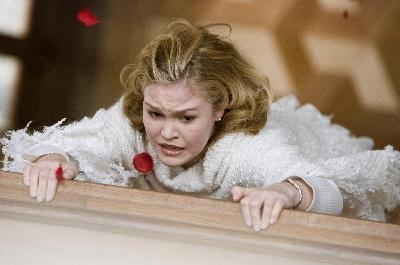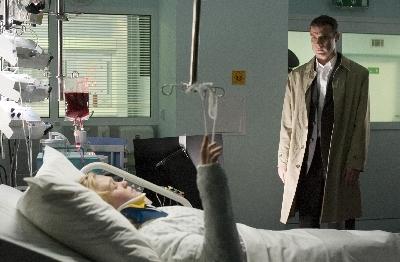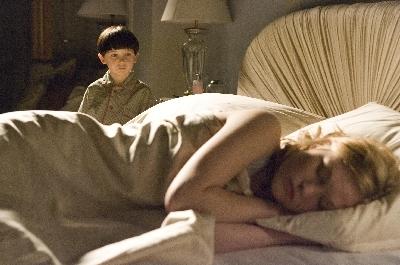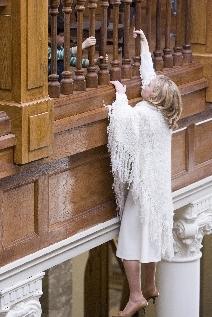|
From HouseofHorrors.com Interviews Only 25 years old, Julia Stiles has earned a reputation for being a bold and educated young actress. Not one particulary known for her horror roles, she has recently ventured into the performance of character Katherine Thorn in the recent remake of The Omen. Although she brings a youthful identity to the film - she took on her role as the young mother with professionalism and mature sensitivity. Recently signed to appear in the third Bourne film, Bourne Ultimatum - now in pre-production - her career is ripening and going strong. Julia sat down with House of Horrors and a couple others to discuss her thoughts on doing The Omen - being as personal and open as she was informative. Julia walked in the room with a napkin full of peanut M&M's, excusing herself and offering some to the table. Q: Did you pick special colors? We need to know that... (laughs) STILES: No, no, no... (laughs) Actually, I'm much happier talking about M&M's and favorite colors, than, lets say, The Devil... Q: I wanted to ask you about working with Liev again, in the sort of incestuous way that this has come from sister and brother to husband and wife. Have you had anything else to do with each other, or is this the first time that you've gotten back together again? STILES: We sort of kept in touch, and I sort of followed his career after finishing Hamlet. I was so young when I did Hamlet, I was sort of overwhelmed and didn't pay attention. But - I was really, really pleased that they were gonna cast him in this film - cause my first question is, "Who are you gonna get to play Gregory Peck's role?" Because he really has to carry the film. I thought, if anyone can do that it would be Liev, because he has that masculine quality that Gregory Peck had - and you can believe him in a suit, and as someone who could function in the world of politics. Q: When you work on a remake like this - when you're playing a character that previous sceen legends have played - how important is it to work with the director to put that to the side and make this your own? How closely were you working with John and how were you shaping the character in the performance differently from the previous film? STILES: John definitely gave me a lot of freedom to make the part my own. To personalize it. I think that was essential. I remember seeing the original when I was considering doing this, and there was a scene in it where Lee Remick tells Gregory Peck that she needs to see a psychiatrist. It was so chilling to me - and austere - because so much is said, but so little is said... You can really just sense the torment that she's going through. And I thought, "Oh, thats so intriguing. I want to explore that more." I told that to John, and he wanted to as well. We wanted to show her in her happier days before everything goes wrong. So that when things don't go according to plan that you feel that she's lost so much that she wanted - she's been looking forward to being a mother for a long time, and when that goes wrong, she's really riddled with guilt and self doubt. I think that that works even more in this circumstance because, you know, a more mature mother or more experienced mother would probably be able to assert herself more quickly? I felt like the two films are very similar but also the context is different. SO in terms of casting and everything I felt like I had the freedom to make it my own. Q: Have you graduated from Columbia University yet? Or are you still--- STILES: No! God! Oh yeah, I graduated in May. Q: Congratulations. STILES: Thank you. Q: So do you think that being so busy with work - now that you've finished school - are you planning on going to grad school now? STILES: No, because I don't know yet what I would go for. Q: Do you find that its hard to keep personal relationships with how much busywork you're doing and with school going on? STILES: I don't think its harder. I was much more excited about the idea of being nomadic when I was 20 - just starting out acting. I really like the idea - the uncertainty - of being an actor - that you never know where your next job is coming from. Now - I still sort of embrace that - but it is hard. Im lucky that I have a core group of friends that I can keep in touch with. Q: So that when you go back to them, you can just be yourself and not be "hollywood"... Because you don't seem to really "embrace" the "hollywood scene"... STILES: What do you mean by "hollywood scene"? Q: Just so much as being involved in tabloids and having your relationships being put on front pages of magazines... STILES: Well I wouldn't want that to be the selling point. I think that my favorite kinds of actors are the ones that - the ones whose personal lives you know nothing about. I think its much easier to believe an actor on screen playing a character when you don't know anything about what they do in their free time. So I do like to keep my personal life to myself. Q: You live in New York - and you did theater. You first started in theater as a kid, correct? STILES: Yeah, somewhat. Q: And I know you were in "Fran's Bed" with Mia. Are you thinking of doing anymore stage performances? STILES: I would love to. I get so much joy out of being on stage. But I dont know specifically what it would be... I dont want to expose myself too much to NY theater critics. Q: What was particularly unique about working with John, the director? STILES: I would have done anything for him to help him realize his vision. He works closely with a lot of his crew, so there is a comradary on set. There's a feeling that we're all working toward the bigger picture. As opposed to just sort of being an actor for hire - I felt like I was really contributing, and that he wanted my input. And I also just felt supported by him. I respond best when Im encouraged, as opposed to somebody who is at all doubtful in my abilities. So - he's very encouraging. He worked so hard - I knew that this was a very important film to him, so I would have done anything to help him. I trusted him that his instincts were good. Q: How did you communicate with him? What sort of direction... STILES: He's very direct. Thats whats so impressing. Many times, so many directors - they try and come up with some sort of high falutant actorly way to try and describe your inner emotions and all this complex drama thats going on - and its like, "I kinda know what you're talking about..." Its hard. It was really refreshing that he just cut to the chase. Be more happy, be more sad! I mean obviously it wasn't that simple. We did all that sort of backstory discussion early on in rehearsals, so by the time we got on set and we already knew where we were with things... Q: How much rehearsal? STILES: Um - it wasn't really any. But we spent a lot of time talking about the story. Also, Liev and I - we were careful to rework some of the scenes early on. We really wanted to establish a close loving relationship. Q: How many takes did you do? STILES: I dont know - I never really pay attention to any of that. Q: I mean, a lot, or... STILES: It was fewer in general, overall. But when it was important, and it needed to be perfect, we did more. I mean, thats usually dictated by how tight the schedule is. Q: How long did you shoot in Prague? STILES: Ummm... two months. Q: Were you there the whole time? STILES: Yeah, in Prague. And then they were supposed to shoot in Croatia which ended up getting nixed because of some arson. It was difficult to get film permits everywhere. So, then we did some reshoots in Rome. Q: Getting back to working with John - technically, what was his approach to choreography? STILES: Oh, he encouraged me a lot to watch the playback, which I, up until this film, never really wanted to do because I come from a theatrical background, where I didn't wanna be aware of the camera - I wanted to be sort of in my own head. He encouraged me to watch playbacks so that I could see what he was going for - and it actually really helped, it did make me more self conscious, and I wish that I had done that more often. Q: Have you seen the film? STILES: Yeah. Q: Was there anything in it that surprised you? STILES: I really was absorbed in the story and I knew everything that was gonna happen - and I still... was very tense watching it. It was very suspensful to me. Thats a testament to John I think. And I normally - when I watch myself on film Im preoccupied with my own performance - Im very critical of it - and I quickly forgot about that watching this movie. I got swept into the story. Q: How do you choose your projects? STILES: I used to be much more careful about the choices I made and it was much more a thing of whether the character was interesting. Now Ive learned to pay attention to all the other elements in the movie - that go into a film. Like, I wanna know... First and foremost I think its essential that the director is somebody that Id want to work with. Because its so much in his hands. Also, its sort of the whole package, like how... what the intention of the director is in terms of the overall story, and also, can I - is there something that I wanna explore in the character. So with this one, I definitely thought there was a lot to explore. Q: What do you think this movie has to do with today? Is there a particular message in it thats relevant to today? Q: Id like to go back to a different question - this is a deeper question, a little more mosiac. So many young actors today have their own production company - instead of being called upon they seek out their own material. Are you working that way? Do you have a production company? STILES: I dont have a production company but I am developing a film. It my own little pride and joy. Im producing an adaptation of "The Bell Jar" by Sylvia Plath - I found a writer to write it and she's in the process of writing the first draft. Her name is Kristin Skyler - she's a young woman. She and I have a very similar take on the book. Ive invested so much into the film that Im excitied and anxious to see it made. Q: What is it that drew you to adapt that book? STILES: The book is so - people always sort of associate something bleak and dark with depression, and this book is so vibrant and full of vivid, beautiful, hallucinogenic imagery and I thnk thats just right for moviemaking. So I'd sort of like to reintroduce it to a new audience. HoH thanks everyone involved, including 20th Century Fox, who were outstanding hosts that went above and beyond. Hopefully the interviews with director John Moore and cast gives a good hint as to what you can expect from this much anticipated horror remake. BS aside, looking back, over the buzz that it first created, The Omen was done good. Im not a big fan of Julia Stiles - and that being the most negative thing I can say, she didn't annoy me in the least. Missing is the archaic, satanic soundtrack by the likes of the great Jerry Goldsmith. The score to this is fair at best. But the acting and homage paid to the original is above par - even better the screenplay is not hacked. Just accentuated for our times. Its not going to win academy awards, but in light of American Haunting, See No Evil, Stay Alive, and the other stuff that has been coming out - if you've been saving your money and waiting for something exceptional to see - check out The Omen, for sure. If you've missed any of our coverage on The Omen (2006) - here's everything you need. Film Review: The Omen (2006) © Copyright by HouseofHorrors.com |




